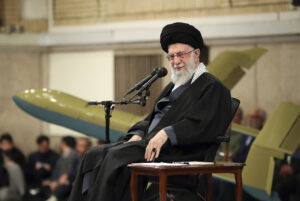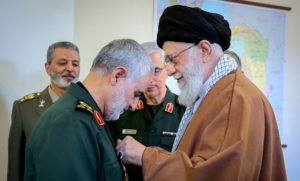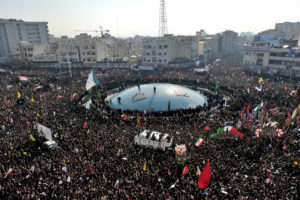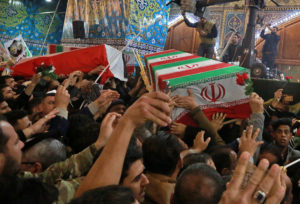Tankers Struck in Strait of Hormuz; U.S. Blames Iran
The operators of the Norwegian- and Japanese-owned ships offered no immediate explanation on who or what damaged them.DUBAI, United Arab Emirates—The U.S. blamed Iran for suspected attacks on two oil tankers Thursday near the strategic Strait of Hormuz, denouncing what it called a campaign of “escalating tensions” in a region crucial to global energy supplies.
The U.S. Navy rushed to assist the stricken vessels in the Gulf of Oman off the coast of Iran, including one that was set ablaze. The ships’ operators offered no immediate explanation on who or what caused the damage against the Norwegian-owned MT Front Altair and the Japanese-owned Kokuka Courageous. Each was loaded with petroleum products, and the Front Altair burned for hours, sending up a column of thick, black smoke.
U.S. Secretary of State Mike Pompeo said the U.S. assessment of Iran’s involvement was based in part on intelligence as well as the expertise needed for the operation. It was also based on recent incidents in the region that the U.S. also blamed on Iran, including the use of limpet mines — designed to be attached magnetically to a ship’s hull — to attack four oil tankers off the nearby Emirati port of Fujairah and the bombing of an oil pipeline in Saudi Arabia by Iranian-backed fighters in May, he said.
“Taken as a whole these unprovoked attacks present a clear threat to international peace and security, a blatant assault on the freedom of navigation and an unacceptable campaign of escalating tension by Iran,” Pompeo said. He provided no evidence, gave no specifics about any plans and took no questions.
At the United Nations, the United States asked for closed Security Council consultations on the tanker incidents later Thursday.
Iran denied being involved in the attacks last month and its foreign minister called the timing of Thursday’s incidents suspicious, given that Japanese Prime Minister Shinzo Abe was meeting Supreme Leader Ayatollah Ali Khamenei in Tehran.
Pompeo noted that Abe had asked Iran to enter into talks with Washington but Tehran “rejected” the overture.
“The supreme leader’s government then insulted Japan by attacking a Japanese-owned oil tanker just outside Iranian waters, threatening the lives of the entire crew, creating a maritime emergency,” Pompeo added.
Iran previously used mines against oil tankers in 1987 and 1988 in the “Tanker War,” which saw the U.S. Navy escort ships through the region. Regardless of who is responsible, the price of a barrel of benchmark Brent crude spiked as much as 4% immediately after the attack, showing how critical the region remains to the global economy.
“The shipping industry views this as an escalation of the situation, and we are just about as close to a conflict without there being an actual armed conflict, so the tensions are very high,” said Jakob P. Larsen, head of maritime security for BIMCO, the largest international association representing ship owners.
The suspected attacks occurred at dawn Thursday about 40 kilometers (25 miles) off the southern coast of Iran. The Front Altair, loaded with the flammable hydrocarbon mixture naphtha from the United Arab Emirates, radioed for help as it caught fire. A short time later, the Kokuka Courageous, loaded with methanol from Saudi Arabia and Qatar, also called for help.
The U.S. Navy sent a destroyer, the USS Bainbridge, to assist, said Cmdr. Joshua Frey, a 5th Fleet spokesman. He described the ships as being hit in a “reported attack,” without elaborating.
In Washington, senior U.S. officials said the U.S. had photographed an unexploded mine on the side of one of the tankers. The officials, who spoke on condition of anonymity to discuss the sensitive matter, said the U.S. will reevaluate its presence in the region and is considering a plan to provide military escorts for merchant ships.
Frontline, the firm that operates the Front Altair, told The Associated Press that an explosion was the cause of the fire. Its crew of 23 — from Russia, the Philippines and Georgia — was safely evacuated to the nearby Hyundai Dubai vessel, it said.
BSM Ship Management said the Kokuka Courageous sustained hull damage and its 21 Filipino sailors had been evacuated, with one suffering minor injuries. All 21 were placed aboard the Bainbridge, according to Lt. Col. Earl Brown, a spokesman for the U.S. Central Command.
Earlier, Iranian state television said 44 sailors from the two tankers were transferred to an Iranian port in the southern province of Hormozgan. The discrepancy could not be immediately reconciled.
The Front Altair had been bound for Taiwan, the Kokuka Courageous for Singapore, according to the data firm Refinitiv.
According to a U.S. official, initial evidence suggested the attack against the Kokuka Courageous was conducted by Iran with a mine similar to what was used against oil tankers off the UAE last month. The official, who declined to provide additional details or evidence, spoke on condition of anonymity in order to discuss initial findings that have not been made public.
Like in Fujairah, dozens of ships ranging from massive oil tankers to smaller pleasure boats, traditional dhows and cargo vessels ply the waters of the strait and the Gulf of Oman. The navies of Iran, Oman, the UAE and the U.S. regularly patrol, but the waters are vast and lit only by the moonlight at night, allowing small vessels to approach without warning.
Tensions have escalated in the Mideast as Iran appears poised to break the 2015 nuclear deal with world powers, an accord that President Donald Trump repudiated last year. The deal saw Tehran agree to limit its enrichment of uranium in exchange for the lifting of crippling sanctions. Now, Iran is threatening to resume enriching uranium closer to weapons-grade levels if European nations don’t offer it new terms to the deal by July 7.
Already, Iran says it quadrupled its production of low-enriched uranium. Meanwhile, U.S. sanctions have cut off opportunities for Iran to trade its excess uranium and heavy water abroad, putting Tehran on course to violate terms of the nuclear deal regardless.
In May, the U.S. rushed an aircraft carrier strike group and other military assets to the region in response to what it said were threats from Iran.
As tensions have risen, so have calls from some members of Congress warning the U.S. administration that they do not have the authority to go to war with Iran under the authorization passed after the Sept. 11, 2001 attacks.
But Pompeo sees it differently, according to U.S. Reps. Elissa Slotkin, a Democrat, and Matt Gaetz, a Republican, who said Thursday they have heard the secretary of state argue in briefings that the administration can authorize war on Iran.
For nearly two decades the 2001 authorization has been stretched to justify combat with Islamist militants in the Middle East and beyond, mostly recently the Obama administration used it during the fight against the Islamic State.
___
Associated Press writers Aya Batrawy in Dubai, David Rising in Berlin, Mari Yamaguchi in Tokyo, Lolita C. Baldor, Zeke Miller and Susannah George in Washington and Amir Vahdat in Tehran, Iran, contributed.
Your support matters…Independent journalism is under threat and overshadowed by heavily funded mainstream media.
You can help level the playing field. Become a member.
Your tax-deductible contribution keeps us digging beneath the headlines to give you thought-provoking, investigative reporting and analysis that unearths what's really happening- without compromise.
Give today to support our courageous, independent journalists.






You need to be a supporter to comment.
There are currently no responses to this article.
Be the first to respond.